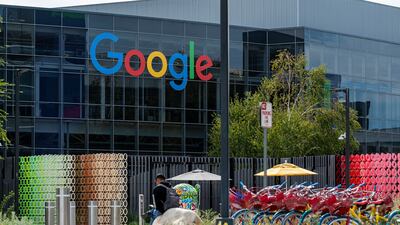Shares of Google’s parent company Alphabet rose in after-hours trading on Tuesday after its third-quarter earnings report, which surpassed analysts' expectations.
Strong quarterly performance, driven by Google’s cloud business, kicked off a major earnings week for tech companies, boosting market confidence ahead of the US presidential election next week.
“Alphabet's report confirms the overall trend that we should expect a very strong season for tech earnings,” Thomas Monteiro, senior analyst at investing.com, told The National.
“The main reason for that is the continuously evolving backdrop both on the macro and financial fronts as companies continue to price in a faster growth environment ahead.”
Meta and Microsoft are set to release their reports on Wednesday, with Apple and Amazon expected Thursday.
The world's largest provider of search and video advertisements reported a net profit of more than $26.3 billion, about 33.5 per cent up on a yearly basis. It was 11.4 per cent up on a quarterly basis.
The California-based company reported a 15 per cent annual increase in its last-quarter revenue to about 88.3 billion, beating analysts’ estimates of $86.3 billion. Its earnings for each share increased 36.7 per cent yearly to $2.12, exceeding LSEG projections of $1.85.
Why is market upbeat about Alphabet’s stock?
Analysts suggest that Alphabet stock has been “fairly valued or even undervalued” in a market lacking strong positive momentum.
However, the current situation – probably involving favourable market or company-specific factors – appears well-positioned to prompt analysts to raise their expectations for the stock's performance in the fourth quarter and beyond, Mr Monteiro said.
After the earnings announcement, the company's shares rose by about 5.9 per cent in after-hours trading to about $181.2 a share.

The company’s stock closed 1.7 per cent higher at $171.1 a share on Tuesday, giving Alphabet a market valuation of $2.1 trillion.
Alphabet earned about 49 per cent of its third-quarter revenue, or more than $43.1 billion, from the US market.
In Europe, the Middle East and Africa, the company earned about $25.5 billion, or 29 per cent of its total sales.
Alphabet’s operating income soared 32 per cent on an annual basis in the third quarter to about $28.5 billion.
Why analysts are cautious about Google cloud business
The total revenue from the cloud business grew an annual 34.9 per cent to more than $11.3 billion in the September quarter, exceeding expectations of $10.8 billion.
Bolstered by an uptake in generative artificial intelligence solutions during the past months, Alphabet’s cloud business is facing stiff competition from companies like Oracle, Amazon Web Services and Microsoft Azure.
Alphabet said its operating income in the cloud segment reached $1.9 billion during the quarter. It improved significantly from the third quarter of last year when the division’s income was $266 million.

However, Mr Monteiro cautioned over Alphabet’s cloud business. Although it’s improving, the growth is not yet strong enough to justify significantly higher expectations for future quarters, he said.
“Alphabet faces tough competition in cloud and AI, requiring increased spending to keep up with rivals who currently have an advantage in these areas. Alphabet still has catch-up work to do in the cloud and AI segments to match the momentum of its competitors.”
During the investors call, chief executive Sundar Pichai said the “full-stack” of AI products is now being used by billions of users and “creating a virtuous cycle”.
“In cloud, our AI solutions are helping drive deeper product adoption with existing customers, attract new customers and win larger deals,” Mr Pichai said.
The company also plans to expedite efforts around AI to streamline work and release cash for other projects.
“I plan to build on these efforts but also evaluate where we might be able to accelerate work and where we might need to pivot to free up capital for more attractive opportunities,” Alphabet’s chief financial officer Anat Ashkenazi said during the investors’ call.
Google services business – which includes advertisements, Android, Chrome, hardware, Maps, Search, Google Play and YouTube – accounted for about 86.6 per cent of the company’s total sales.
It added more than $76.5 billion to overall revenue, almost 12.5 per cent more than the third quarter of last year.
Google’s advertising revenue from Search, YouTube and other businesses increased 10.4 per cent to more than $65.8 billion in the third quarter.
The company’s operating loss from other bets, or subsidiaries, reached about $1.1 billion in the last quarter, narrowed from a loss of about $1.2 billion in the same period last year.
Other bets are derived mainly through the sale of internet offerings, as well as licensing and research and development services.
This includes Alphabet’s X lab, self-driving unit Waymo and other non-Google companies.
Alphabet spent more than $12.4 billion on research and development, about 14.1 per cent of its total sales in the third quarter. This was about 10.5 per cent more than the R&D expenditure for the same period last year.
YouTube added more than $8.9 billion to Alphabet’s revenue, increasing about 12.1 per cent annually, against analysts' expectations of $8.8 billion.
Google’s total acquisition costs stood at more than $13.7 billion, up about 8.5 per cent on an annual basis, against analysts’ expectations of $13.5 billion.
TACs are payments that search companies make to affiliates and online companies to bring traffic to their websites. It is a major expense for companies such as Google and Yahoo.





















